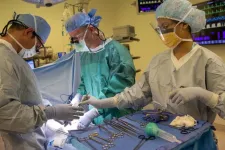(Press-News.org) The study, published today in PLOS ONE, is the first to assess human ability to detect artificially generated speech in a language other than English.
Deepfakes are synthetic media intended to resemble a real person’s voice or appearance. They fall under the category of generative artificial intelligence (AI), a type of machine learning (ML) that trains an algorithm to learn the patterns and characteristics of a dataset, such as video or audio of a real person, so that it can reproduce original sound or imagery.
While early deepfake speech algorithms may have required thousands of samples of a person’s voice to be able to generate original audio, the latest pre-trained algorithms can recreate a person’s voice using just a three-second clip of them speaking1. Open-source algorithms are freely available and while some expertise would be beneficial, it would be feasible for an individual to train them within a few days2.
Tech firm Apple recently announced software for iPhone and iPad that allows a user to create a copy of their voice using 15 minutes of recordings3.
Researchers at UCL used a text-to-speech (TTS) algorithm trained on two publicly available datasets, one in English and one in Mandarin, to generate 50 deepfake speech samples in each language. These samples were different from the ones used to train the algorithm to avoid the possibility of it reproducing the original input.
These artificially generated samples and genuine samples were played for 529 participants to see whether they could detect the real thing from fake speech. Participants were only able to identify fake speech 73% of the time, which improved only slightly after they received training to recognise aspects of deepfake speech.
Kimberly Mai (UCL Computer Science), first author of the study, said: “Our findings confirm that humans are unable to reliably detect deepfake speech, whether or not they have received training to help them spot artificial content. It’s also worth noting that the samples that we used in this study were created with algorithms that are relatively old, which raises the question whether humans would be less able to detect deepfake speech created using the most sophisticated technology available now and in the future.”
The next step for the researchers is to develop better automated speech detectors as part of ongoing efforts to create detection capabilities to counter the threat of artificially generated audio and imagery.
Though there are benefits from generative AI audio technology, such as greater accessibility for those whose speech may be limited or who may lose their voice due to illness, there are growing fears that such technology could be used by criminals and nation states to cause significant harm to individuals and societies.
Documented cases of deepfake speech being used by criminals include one 2019 incident where the CEO of a British energy company was convinced to transfer hundreds of thousands of pounds to a false supplier by a deepfake recording of his boss’s voice4.
Professor Lewis Griffin (UCL Computer Science), senior author of the study, said: “With generative artificial intelligence technology getting more sophisticated and many of these tools openly available, we’re on the verge of seeing numerous benefits as well as risks. It would be prudent for governments and organisations to develop strategies to deal with abuse of these tools, certainly, but we should also recognise the positive possibilities that are on the horizon.”
Notes to Editors:
1 For more information, see the Microsoft website.
2 The Alan Turing Institute has published a report on voice cloning at scale, available here.
3 See the Apple website for more details.
4 More details of the case can be found on the Wall Street Journal.
For more information, please contact:
Dr Matt Midgley
+44 (0)20 7679 9064
m.midgley@ucl.ac.uk
Publication:
Kimberly Mai et al. ‘Warning: humans cannot reliably detect speech deepfakes’ is published in PLOS ONE and is strictly embargoed until 2 August 2023 19:00 BST / 14:00 ET.
DOI: https://doi.org/10.1371/journal.pone.0285333
About UCL – London’s Global University
UCL is a diverse global community of world-class academics, students, industry links, external partners, and alumni. Our powerful collective of individuals and institutions work together to explore new possibilities.
Since 1826, we have championed independent thought by attracting and nurturing the world's best minds. Our community of more than 50,000 students from 150 countries and over 16,000 staff pursues academic excellence, breaks boundaries and makes a positive impact on real world problems.
We are consistently ranked among the top 10 universities in the world and are one of only a handful of institutions rated as having the strongest academic reputation and the broadest research impact.
We have a progressive and integrated approach to our teaching and research – championing innovation, creativity and cross-disciplinary working. We teach our students how to think, not what to think, and see them as partners, collaborators and contributors.
For almost 200 years, we are proud to have opened higher education to students from a wide range of backgrounds and to change the way we create and share knowledge.
We were the first in England to welcome women to university education and that courageous attitude and disruptive spirit is still alive today. We are UCL.
www.ucl.ac.uk | Follow @uclnews on Twitter | Read news at www.ucl.ac.uk/news/ | Listen to UCL podcasts on SoundCloud | Find out what’s on at UCL Minds
END
Humans unable to detect over a quarter of deepfake speech samples
2023-08-02
ELSE PRESS RELEASES FROM THIS DATE:
Study exposes plight of deported noncitizen veterans
2023-08-02
RIVERSIDE, Calif. -- A study examining the effects of deportation on the health and wellbeing of noncitizen veterans who served in the United States military has found that this group is a vulnerable and often unrecognized health disparity population.
Overseen by Ann Cheney, an associate professor of social medicine, population, and public health in the School of Medicine at the University of California, Riverside, the study reports the post-deportation economic, social, and political conditions of living abroad harm veterans’ physical and ...
Lockdowns create global appetite for feeding feathered friends
2023-08-02
A team of researchers have highlighted the role that the COVID-19 pandemic played in connecting people around the world more with our feathered friends while in lockdowns, finding a surge in interest for bird feeding information and providing more insight into global human-birds interactions.
Professor Emeritus Darryl Jones, from Griffith’s Centre for Planetary Health and Food Security, and the research team used Google search index (a valid proxy parameter from Google Trends data) and found a surge of interest in bird feeding in 115 countries after Covid-19 led to lockdowns where people stayed home.
Professor Jones, alongside lead author Associate Professor ...
Researchers discover a novel pathway that minimizes liver injury during transplantation
2023-08-02
UCLA-led research describes the role that a protein called CEACAM1 plays in protecting the liver from injury during the transplantation process, potentially improving transplant outcomes. But the features that regulate this protective characteristic remain unknown.
In a new study, to be published online Aug. 2 in Science Translational Medicine, a research team has identified the molecular factors at the root of this protection and shown how using molecular tools and alternative gene splicing can make CEACAM1 more protective, thus reducing organ injury and ultimately improving post-transplant outcomes.
Prior to transplantation, a solid organ, such as a liver, has no ...
UIC leads field study on home, water safety after Ohio chemical spill
2023-08-02
In February, the train derailment and subsequent chemical spill and fires in East Palestine, Ohio, caused an environmental emergency that led thousands of people to evacuate their homes. A multi-university study led by the University of Illinois Chicago will investigate the aftermath of that disaster, collecting data on the experiences of nearby residents and the effectiveness of communication from authorities about water, soil and air quality.
For the study, the researchers will conduct surveys and interviews with residents in and near East Palestine, including counties ...
MD Anderson research highlights for August 2, 2023
2023-08-02
HOUSTON ― The University of Texas MD Anderson Cancer Center’s Research Highlights showcases the latest breakthroughs in cancer care, research and prevention. These advances are made possible through seamless collaboration between MD Anderson’s world-leading clinicians and scientists, bringing discoveries from the lab to the clinic and back.
Recent developments include a novel biomarker that may predict the aggressiveness of pancreatic cancer precursors, insights into the structure and function of a breast and ovarian cancer susceptibility gene, a new approach to overcoming treatment resistance in ovarian cancer, distinguishing features of young-onset ...
August issues of American Psychiatric Association journals cover alcohol use disorder, interventions for PTSD and psychedelics in psychiatry
2023-08-02
The latest issues of three of the American Psychiatric Association’s journals, The American Journal of Psychiatry, Psychiatric Services and Focus are now available online.
The August issue of The American Journal of Psychiatry on the neurodevelopmental origins of psychopathology is focused on early-life adversity and genetics as mediators of the risk to develop psychiatric illnesses. Highlights include:
Overview of Alcohol Use Disorder.
A Comprehensive Multilevel Analysis of the Bucharest Early Intervention Project: Causal Effects on Recovery from Early Severe Deprivation. ...
Eyewitnesses to Arctic Change
2023-08-02
On Thursday, 3 August 2023, the research vessel Polarstern is scheduled to set off from Tromsø, Norway, towards the North Pole. For two months, a good fifty scientific expedition participants will explore the Arctic in transition as sea ice extent reaches its annual minimum in September. They will explore the biology, chemistry and physics of sea ice as well as the effects of sea ice retreat on the entire ocean system from the surface to the deep sea. Eleven years ago, Antje Boetius was part of the largest ever sea ice minumum in the Arctic ...
New neuroimaging approach could improve diagnosis of schizophrenia
2023-08-02
ATLANTA — New research led by scientists working with Georgia State University’s TReNDS Center has identified age-related changes in brain patterns associated with the risk for developing schizophrenia.
The discovery could help clinicians identify the risk for developing mental illness earlier and improve treatment options. The study is published in the Proceedings of the National Academy of Sciences (PNAS).
The research is part of a collaboration by experts from the University of Bari Aldo Moro, the Lieber Institute of Brain Development and the Tri-institutional Center for Translational Research in ...
Scientists discover unusual ultrafast motion in layered magnetic materials
2023-08-02
A common metal paper clip will stick to a magnet. Scientists classify such iron-containing materials as ferromagnets. A little over a century ago, physicists Albert Einstein and Wander de Haas reported a surprising effect with a ferromagnet. If you suspend an iron cylinder from a wire and expose it to a magnetic field, it will start rotating if you simply reverse the direction of the magnetic field.
“Einstein and de Haas’s experiment is almost like a magic show,” said Haidan Wen, a ...
New review calls on Hockey Canada to raise age of body contact from 13 to 15
2023-08-02
Hockey leagues in Canada should overhaul current rules and regulations to raise the age of bodychecking in the game from 13 to 15, says new research into the effect of body contact on teens.
The literature review was led by Dr. Kristian Gouletnorth_eastexternal link of the University of Ottawa’s Faculty of Medicine and Children’s Hospital of Eastern Ontario (CHEO) and calls on provincial and territorial governments to mandate schools – including those involved with school sports – and sports organizations to establish, ...




